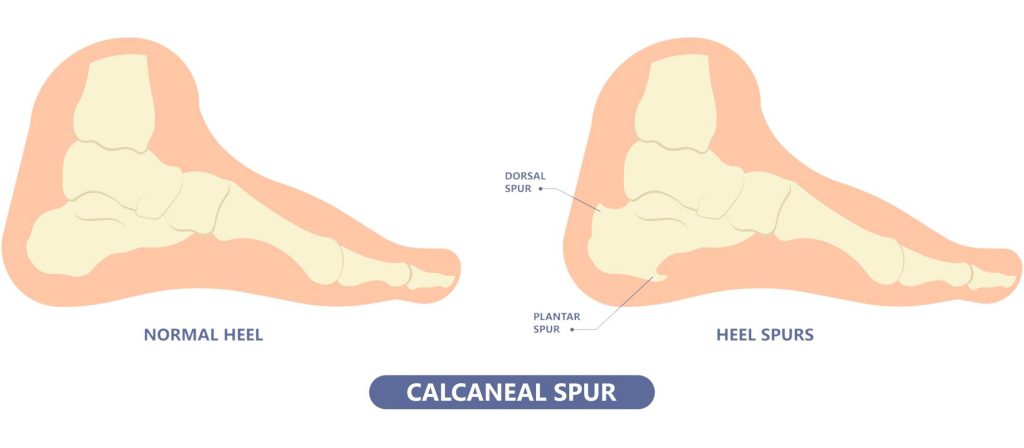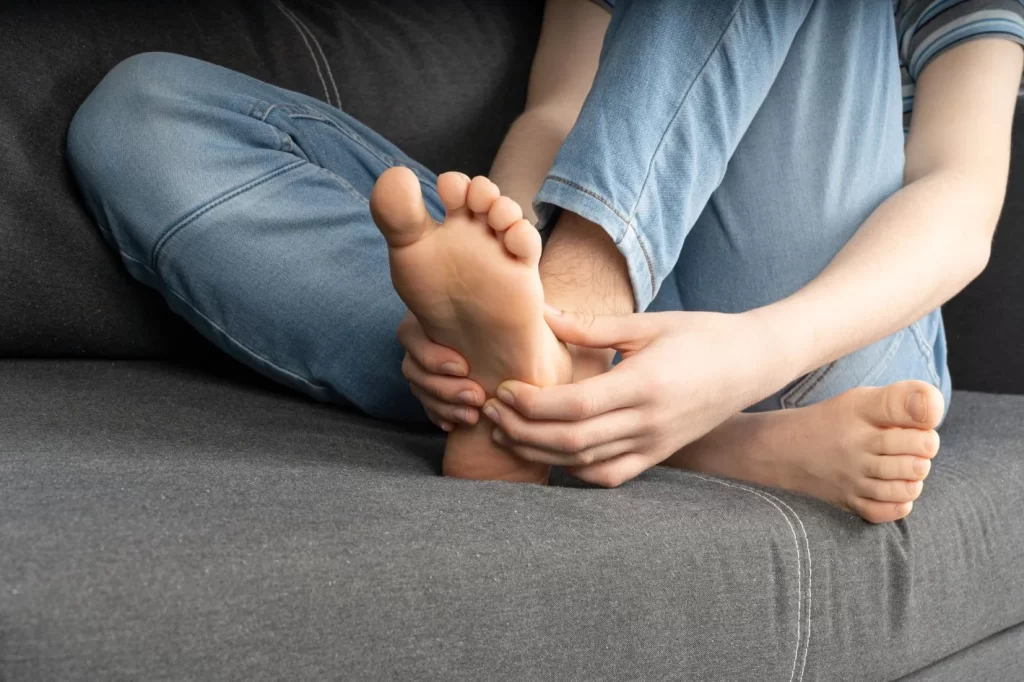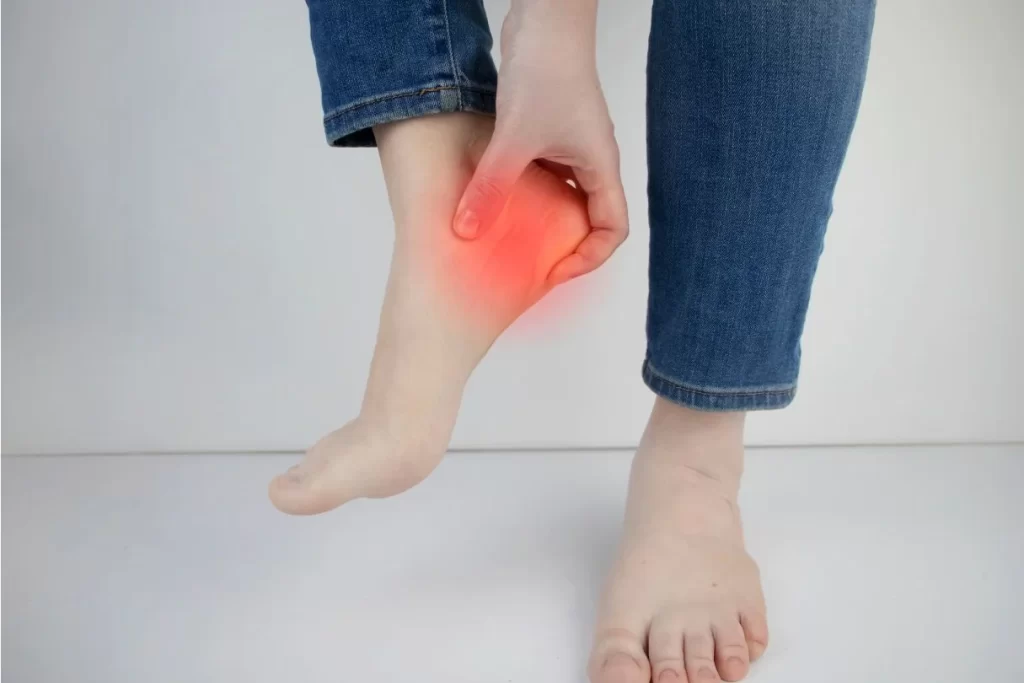What are Heel Spurs?
Imagine taking a step and feeling as if a stone is lodged deep in your heel. While that kind of pain can come from several causes, one possible finding is a heel spur. This refers to a small bony outgrowth, called a calcaneal spur, that develops on the heel bone. Despite the name, the spur itself is rarely the source of pain. More often, the discomfort comes from nearby tissues such as the plantar fascia or the Achilles tendon.
To understand why heel spurs form, it helps to look at how this part of the foot works as a weight-bearing structure. With every step, pressure travels through the heel, especially at the points where tendons and ligaments attach. When these areas are placed under repeated strain due to long hours on hard floors, frequent running, or footwear that lacks support, the body responds by depositing calcium. Over time, these deposits can harden into a spur. Because this process is gradual and often silent, many people only learn they have a spur when it shows up on an X-ray.
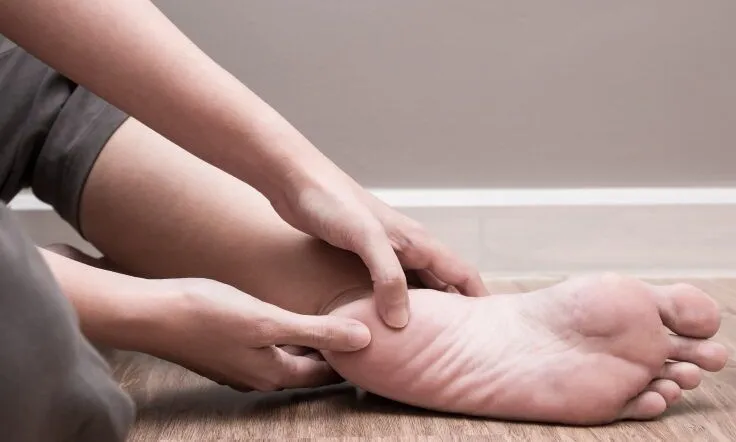
Need Help? See Our Podiatrist Today
Causes of Heel Spurs
Heel spurs develop as a reaction to ongoing stress at the bottom of the heel. When the plantar fascia repeatedly pulls on its attachment to the heel bone during movement, small areas of strain begin to form. In trying to repair this micro-trauma, the body deposits extra bone at the site. Over time, these deposits can harden into a spur. Because anything that increases pulling forces on the heel can add to this process, it is helpful to look at what drives spur formation and who carries higher baseline risk.
What Drives Heel Spur Formation
- Repeated overuse of the plantar fascia from training or long periods on hard ground
- Shoes that are worn out or poorly supportive, forcing the heel to absorb more strain
- Muscle weakness or imbalances that shift load unevenly through the foot
- Limited mobility in the foot that reduces shock absorption with each step
- Excessive inward rolling of the foot (overpronation) or other biomechanical changes
- Structural variations such as leg length difference, bowed legs, or knocked knees (Genu Valgum)
- Walking or running patterns that overload the heel and its supporting ligaments
- Conditions such as inflammatory arthritis that add to tissue stress
- Thinning of the fat pad beneath the heel, reducing its natural cushioning
Who Carries Higher Baseline Risk?
- People with long-standing plantar fasciitis or other tendon problems that keep tissues under tension
- Those with flat feet (Pes Planus) or high arches (Pes Cavus), which both alter how force travels through the heel
- Individuals with tight calf muscles or a tight plantar fascia band that increase pulling on the heel bone
- People with obesity or a high BMI, adding extra load with each step
- Older adults, as fascia flexibility declines and the protective heel fat pad thins
- Regular wearers of high heels, which strain the fascia and may shorten the Achilles tendon
- Athletes such as runners and jumpers who repeatedly load the heel on hard surfaces
- Individuals with gait abnormalities or leg length differences that place uneven stress on the heel
- Those with underlying systemic conditions such as ankylosing spondylitis or Rheumatoid Arthritis
- Anyone relying on worn-out or unsupportive footwear that fails to cushion impact
Managing and Preventing Heel Spurs
The heel works like a shock absorber with every step, absorbing and transferring force through the foot. Because of this constant loading, problems often arise in the tissues that anchor to the heel bone rather than from the spur itself. When a heel spur is present, the focus of management is therefore on reducing strain in these tissues instead of removing the bone. From there, care begins with calming irritation and gradually progresses to rebuilding strength and flexibility so the heel can handle daily load more comfortably.
The first step is to settle pain and give the heel better support:
- Supportive shoes with cushioning soles to soften impact
- Custom insoles (orthotics) to offload the plantar fascia and redistribute pressure
- Taping for temporary relief during painful phases
Once symptoms ease, the next goal is to restore movement and improve resilience:
- Stretching and strengthening exercises for the calf and foot muscles
- Gait retraining to address issues such as overpronation
- Foot mobilisation techniques to improve flexibility and alignment
- Adjustments to training load to reduce repetitive stress on the heel
If discomfort or pain persists despite these steps, more targeted options should be considered:
- Extracorporeal Shockwave Therapy (ESWT) to stimulate stubborn tissues to heal
- Dry needling to release muscle tension around the heel
- Surgery, reserved for rare cases where conservative care fails
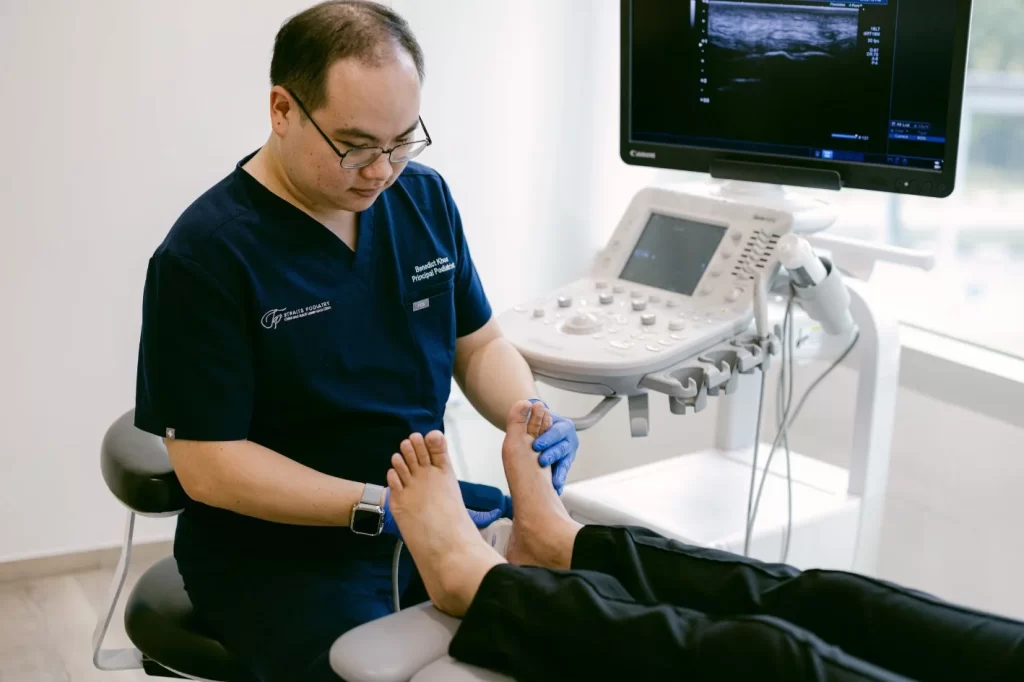
Get the Right Care for Heel Spurs at Straits Podiatry
Hearing that you have a heel spur can feel alarming, especially if you picture a sharp bony spike causing every step to hurt. In reality, most spurs are painless, and the discomfort or pain often comes from the surrounding tissues rather than the spur itself. At Straits Podiatry we explain this clearly, so you understand what is really driving your symptoms and why procedures rarely target the bone directly.
From there our podiatrists assess your foot mechanics, footwear, daily activities and training load to identify the true source of stress on your heel. With these insights we craft a practical plan that reduces strain, restores comfort, and helps you move confidently again. If focused options such as ESWT are needed, they are added as part of a complete approach. Book a consultation today and take the next step toward clarity and pain relief.
Frequently Asked Questions
What causes heel spurs, and how can they be managed?
Heel spurs form when repeated stress on the plantar fascia creates strain where it attaches to the heel bone, often due to running, prolonged standing, or wearing unsupportive shoes. Management focuses on easing pressure through supportive footwear, custom orthotics, stretching, and physical therapy, with advanced options such as ESWT considered if discomfort or pain persists.
How are heel spurs diagnosed?
How do I know if I have a heel spur?
A heel spur may feel like a hard bump or a sharp, pointy spot when touching the heel. Many people notice pain when walking, running, or even standing, often described as a jabbing sensation. The bone itself does not hurt, but the surrounding tissues can become irritated, which is what leads to discomfort during movement.
What does plantar fasciitis have to do with heel spurs?
Heel spurs often develop in people who have long-standing plantar fasciitis, as the repeated pulling of the inflamed plantar fascia can encourage calcium buildup on the heel bone. While a spur does not cause plantar fasciitis, the two conditions frequently appear together and might produce similar heel pain symptoms, which is why they are often discussed side by side
Will a heel spur resolve on its own?
Search
You May Also Like
Do You Have A Question? Ask Us...
Search
Do You Have A Question? Ask Us...
You May Also like
Categories
Categories
- Ankle (4)
- Diabetic Foot (7)
- Feet (5)
- Knee (5)
- Paediatric Lower (5)
- Soft Tissue (3)
- Uncategorized (60)

